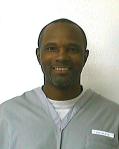OKLAHOMA CITY — The district attorney for the state’s largest county is accusing the Oklahoma Pardon and Parole Board of violating state law.
Wednesday, Oklahoma County D.A. David Prater issued a letter to the Pardon and Parole Board Executive Director, Terry Jenks, alleging the board is in violation of the Open Meeting Act.
D.A. Prater believes the board has knowingly and secretly paroled inmates who are not legally eligible for parole.
Read the Notice of Open Meeting Act Violations to the Pardon and Parole Board here.
In the letter to the board, Prater alleges that the board routinely engages in a secret meeting that is in violation of the Open Meeting Act because the meeting is not properly disclosed on any publicly available agenda.
Prater’s investigation started in July and stems from a complaint about early parole consideration for an inmate, Maelene Chambers, who is not legally allowed to be considered for parole until 2016.
 Chambers was convicted of manslaughter in 2008.
Chambers was convicted of manslaughter in 2008.
She is not eligible for parole until 2016.
However, Chambers was mysteriously scheduled for parole consideration by the board in July.
In his letter to the board, Prater outlines a parole process by which the board places inmates like Chambers on a private docket called the “Pre-Docket Investigation” or “PDI.”
Prater alleges that the PDI is a violation of the state Open Meeting statute where any discussions about inmate parole should be posted on a public agenda prior to decision-making.
Fifty-one Oklahoma inmates have entered the PDI process since the start of 2010.
At least five of those inmates were not eligible to be considered for parole because they were convicted of 85-percent crimes; state statute requires such inmates to serve at least 85 percent of their sentence.
Pardon and Parole Board Director Terry Jenks said the board would not make a comment about the allegations until they had a chance to review the letter and discuss it.
The board’s next meeting is scheduled for next Tuesday, Aug. 24.
 Walter Hill Jr. also entered the parole process through the PDI.
Walter Hill Jr. also entered the parole process through the PDI.
Hill was convicted of an 85-percent crime, first-degree burglary, in 2005.
He should not have been considered for parole until 2017.
However, Hill was paroled early this year, after serving about half of his 15-year sentence.
He is no longer in prison.
Defense attorney Scott Adams appears before the Pardon and Parole Board regularly on behalf of his many clients.
He says he has never heard of a Pre-Docket Investigation or a Docket Modification or any sort of secret process.
In fact, one of his clients is listed in Prater’s letter to the board.
“I am absolutely stunned. I’ve been doing this for 23 years and I do a ton of work representing inmates at the Pardon and Parole Board. Although I disagree with a lot of the 85% stuff that we do, it is the law. To circumvent that law I think is wrong.” said Adams.
Here is House Speaker Kris Steele’s statement on Aug. 8 letter to Pardon and Parole Board:
“Our criminal justice system has zero tolerance for even the appearance of playing fast and loose with sentencing laws. For this board especially, anything less than following the absolute letter of the law in the most transparent manner possible is entirely unacceptable. I applaud District Attorney Prater’s efforts. My efforts last month to have the ineligible offender removed from the parole docket were brushed off by the board. I made a reasonable request to Mr. Dugger to simply follow the law, but he declined and said he’d do as he pleased. The effectiveness of this board requires conscientious actions by board members who are committed to following the letter of the law and acting in the best interest of public safety. Avoiding problems like this is one of the reasons the Legislature has put stricter qualifications on the next round of Pardon and Parole Board members. It is critical that the public has full confidence in the important work done by this board. My hope is that these actions are immediately ceased and remedied so the board can begin a new day.”
The Pardon and Parole Board issued this statement Wednesday:
“The Oklahoma Pardon and Parole Board has received Mr. Prater’s letter outlining his concerns with regards to the Open Meetings Act. The Board is reviewing Mr. Prater’s concerns carefully. The Board believes that transparency and openness are essential when dealing with the clemency process to ensure every interested party is dealt with fairly. The Board carefully reviews and considers each offender on an individual basis.
All Board meetings are conducted according to the Oklahoma Open Meeting Act in an open, public forum and the required notice(s) are posted with the Oklahoma Secretary of State.
While the Board believes it has both statutory and Constitutional authority to bring offenders up for early consideration, to ensure the Board process remains open and transparent, the Chairperson will place a moratorium on the early consideration process. In addition, the Agency will request an Attorney General’s Opinion regarding the 85% law and the authority to place offenders on a docket for early consideration.”
Attorney General Scott Pruit issued this statement regarding the allegations:
“Our office has been made aware of the allegations brought forward by Oklahoma County District Attorney David Prater. Indeed, these allegations are of great concern because 85 percent crimes are some of the most heinous crimes committed against Oklahomans. The Legislature established a clear requirement so that victims and their families can be assured that an offender will serve no less than 85 percent of their sentence.”
Any practice, policy or action taken by any board or commission to mitigate or change the time served is wrong—and inconsistent with statute.
I will do everything in my power as Attorney General to ensure that victims have confidence in our legal system and that justice is carried out to the fullest extent.”
The following 46 Oklahoma inmates are most of the 51 inmates who entered into the parole process through a Pre-Docket Investigation.
Some of them have been paroled, some were denied.
D.A. David Prater alleges any decision made about the following inmates should be stricken because their fate was determined during a time that was in violation of state law:























































































